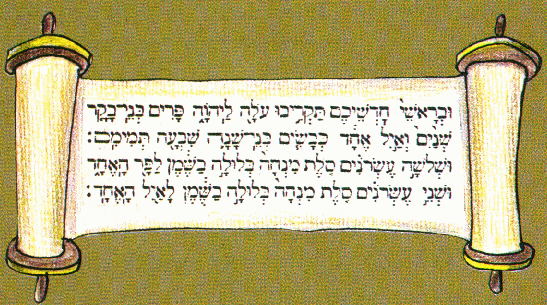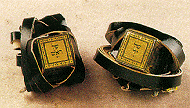

On the Shabbat before Rosh Chodesh it is customary to bless the coming month for the good. This is the time to inform the congregation when the new month will commence and when Rosh Chodesh will fall. Tishrei is the only month which is not blessed beforehand. Rosh Chodesh Tishrei is Rosh Hashana.
 YA'ALE VEYAVO
YA'ALE VEYAVO
 Before the new month is blessed, the exact time of the birth of the new moon is announced. The Ya'ale Veyavo prayer is recited in the Amida in the blessing of Retze (the seventeenth). It is recited in Arvit and Shacharit prayers.
Before the new month is blessed, the exact time of the birth of the new moon is announced. The Ya'ale Veyavo prayer is recited in the Amida in the blessing of Retze (the seventeenth). It is recited in Arvit and Shacharit prayers.
 HALLEL
HALLEL
 TORAH READING
TORAH READING
 Moshe Rabbenu instituted the reading of the Torah on Rosh Chodesh. On Rosh Chodesh the Torah scroll is taken out of the Holy Ark and four people (instead of the usual three called up on Mondays and Thursdays) are called up to the Torah. The reading is from Bamidbar 28.
Moshe Rabbenu instituted the reading of the Torah on Rosh Chodesh. On Rosh Chodesh the Torah scroll is taken out of the Holy Ark and four people (instead of the usual three called up on Mondays and Thursdays) are called up to the Torah. The reading is from Bamidbar 28.
 THE MUSSAF PRAYER
THE MUSSAF PRAYER
 An additional Mussaf prayer is recited on Rosh Chodesh after the reading of the Torah. (Mussaf is recited also on Shabbat and Festival days). The Tefilin are taken off before the Mussaf prayer. The Tefillin are a sign between G-D and the people of Israel. Since Mussaf is itself a sign, there is no need for the Tefilin, and it is recited without Tefilin.
An additional Mussaf prayer is recited on Rosh Chodesh after the reading of the Torah. (Mussaf is recited also on Shabbat and Festival days). The Tefilin are taken off before the Mussaf prayer. The Tefillin are a sign between G-D and the people of Israel. Since Mussaf is itself a sign, there is no need for the Tefilin, and it is recited without Tefilin.
 In the Mussaf prayer we ask G-D to renew this month for us, for good, for pardon of sin and forgiveness of iniquity. The Mussaf prayer contains a passage referring to the sacrifices that were offered in the Beit Hamikdash on Rosh Chodesh.
In the Mussaf prayer we ask G-D to renew this month for us, for good, for pardon of sin and forgiveness of iniquity. The Mussaf prayer contains a passage referring to the sacrifices that were offered in the Beit Hamikdash on Rosh Chodesh.